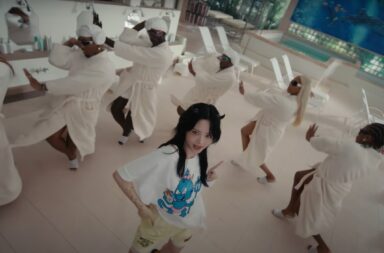 B.A.P filed for contract nullification last month, but there certainly hasn’t been any calm before the legal storm, as news sites and social media have all taken shots at speculation and received refutation from both sides.
B.A.P filed for contract nullification last month, but there certainly hasn’t been any calm before the legal storm, as news sites and social media have all taken shots at speculation and received refutation from both sides.
News broke that B.A.P had sent in a lawsuit to Seoul law offices on November 26th, requesting to cancel their contracts with current company TS Entertainment. The term “slave contracts” became used to categorize the group’s complaints, with the members stating that the contract in question had only benefited the company by treating the entertainers unfairly.
The primary point of contention raised by the lawsuits was an uneven distribution of income between the members and TS Entertainment. The company had reportedly made nearly $10 million in profits since B.A.P’s debut, but the members had only received $17,000 each within the three year interval. Divided over forty months, this sum translated into roughly $500 a month, a salary less than minimum wage in Korea. Profit divisions, as outlined by the contract, split album earnings 1:9 between the group and the company respectively, while wages for concerts, events, and performances was more generous at a 5:5 split.
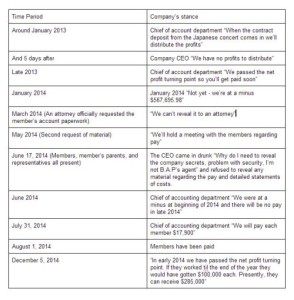 B.A.P stated that the division of profits was not the concern — after all, the members had agreed to these terms through their signatures on the contract — but rather, the suspicious lack of transparency on TS’s part in calculating finances, which seemed to indicate false sums and cheating going on behind closed doors. The group accused TS of fabricating an unexplained “album promotions fee,” as well as presenting the members and their families with contradictory account statements which portrayed the group as consistently at a loss financially. In theory, had the recent performance profits been split equally between the two parties as promised in the contract, then each member would have received at least $100,000 rather than the $17,900 they were actually given.
B.A.P stated that the division of profits was not the concern — after all, the members had agreed to these terms through their signatures on the contract — but rather, the suspicious lack of transparency on TS’s part in calculating finances, which seemed to indicate false sums and cheating going on behind closed doors. The group accused TS of fabricating an unexplained “album promotions fee,” as well as presenting the members and their families with contradictory account statements which portrayed the group as consistently at a loss financially. In theory, had the recent performance profits been split equally between the two parties as promised in the contract, then each member would have received at least $100,000 rather than the $17,900 they were actually given.
Several other aspects of the contract were also mentioned in the lawsuit, including the length and lack of protection afforded to them by TS. While the majority of contracts within the entertainment industry are capped at seven years, B.A.P were signed under a contract which held them for seven years starting from debut rather than the actual signing date. On top of this, absence from entertainment activity for whatever reason (including Himchan‘s One Shot era hiatus to heal a broken hand) would extend the contract terms to make up for the amount of time missed. All medical expenses were covered by the members’ parents rather than the agency, and financial losses due to public criticism, dating scandals, drug use, or any scandal of the sort would require the responsible member to compensate.
 Adding to the laundry list, B.A.P’s side cited a breach of trust as the driving motivation behind the legal action. Beyond withholding financial statements and failing to provide a sufficient explanation of fair monetary distribution, TS has also been accused of disregarding the members’ mental and physical health. Sadly, this claim is hardly a surprising one in the industry, as exemplified by former Exo members’ Kris and Luhan‘s respective lawsuits claiming their company’s disregard for their deteriorating health. Supposedly, a member of B.A.P had collapsed and was taken to the emergency room due to exhaustion from stress and overworking. A company representative arrived to transport the member to a performance in Changwon despite being warned that further physical exertion by the member would exacerbate his condition. A similar incident cited by B.A.P portrayed TS as purposefully disregarding the company doctor’s notes of the members’ health issues and threatening legal action and monetary compensation if the group did not participate in a performance in China.
Adding to the laundry list, B.A.P’s side cited a breach of trust as the driving motivation behind the legal action. Beyond withholding financial statements and failing to provide a sufficient explanation of fair monetary distribution, TS has also been accused of disregarding the members’ mental and physical health. Sadly, this claim is hardly a surprising one in the industry, as exemplified by former Exo members’ Kris and Luhan‘s respective lawsuits claiming their company’s disregard for their deteriorating health. Supposedly, a member of B.A.P had collapsed and was taken to the emergency room due to exhaustion from stress and overworking. A company representative arrived to transport the member to a performance in Changwon despite being warned that further physical exertion by the member would exacerbate his condition. A similar incident cited by B.A.P portrayed TS as purposefully disregarding the company doctor’s notes of the members’ health issues and threatening legal action and monetary compensation if the group did not participate in a performance in China.
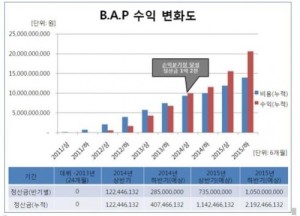 In response, TS published a lengthy press release accusing a third party of working behind the scenes in the conflict between B.A.P and TS Entertainment. The company released an overview of B.A.P’s profit earnings, claiming that the group had reached the break-even point and became profitable just two years after debut and was on track to earn even greater profits had the planned concert tours in South America, Japan, and China not been canceled as a result of the contract disputes. In regards to the profit split ratio, TS claimed that as B.A.P received more commercial and event opportunities, their profit ratio would rise as well. TS also explained the length of contract by citing Fair Trade Commission guidelines that allow for an extension on the seven year contract for “any legitimate reason which may require a long-term contract.” Lastly, the agency accounted for the issues of trust regarding B.A.P’s well-being as a misunderstanding, blaming the members for exhibiting emotional outbursts and creating problems on music broadcasts and programs. After reaching an agreement for a break this fall, TS claims, the members appeared to be satisfied and had notified the company of their intention of a comeback in January before seemingly pulling the lawsuit from thin air.
In response, TS published a lengthy press release accusing a third party of working behind the scenes in the conflict between B.A.P and TS Entertainment. The company released an overview of B.A.P’s profit earnings, claiming that the group had reached the break-even point and became profitable just two years after debut and was on track to earn even greater profits had the planned concert tours in South America, Japan, and China not been canceled as a result of the contract disputes. In regards to the profit split ratio, TS claimed that as B.A.P received more commercial and event opportunities, their profit ratio would rise as well. TS also explained the length of contract by citing Fair Trade Commission guidelines that allow for an extension on the seven year contract for “any legitimate reason which may require a long-term contract.” Lastly, the agency accounted for the issues of trust regarding B.A.P’s well-being as a misunderstanding, blaming the members for exhibiting emotional outbursts and creating problems on music broadcasts and programs. After reaching an agreement for a break this fall, TS claims, the members appeared to be satisfied and had notified the company of their intention of a comeback in January before seemingly pulling the lawsuit from thin air.
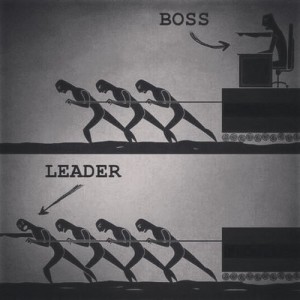 More accusations came out of the mold following TS’s official statement from B.A.P’s side. During a meeting to discuss finances with the members’ families, the CEO of TS had arrived drunk and noncompliant. Staff kept the South American tour a secret from the members in order to ensure they would have no choice but to comply with the schedules. Fan accounts also noticed something off: leader Yongguk had been blatantly edited out of episodes of the group’s web series B.A.P Attack. Daehyun and Himchan had performed for three months without working earpieces, instead being given simple earphones for use on stage. As a result of working under what they felt to be unjust management, B.A.P had planned the lawsuit beginning from May of this year.
More accusations came out of the mold following TS’s official statement from B.A.P’s side. During a meeting to discuss finances with the members’ families, the CEO of TS had arrived drunk and noncompliant. Staff kept the South American tour a secret from the members in order to ensure they would have no choice but to comply with the schedules. Fan accounts also noticed something off: leader Yongguk had been blatantly edited out of episodes of the group’s web series B.A.P Attack. Daehyun and Himchan had performed for three months without working earpieces, instead being given simple earphones for use on stage. As a result of working under what they felt to be unjust management, B.A.P had planned the lawsuit beginning from May of this year.
In the relative quiet following B.A.P’s response statements, other voices began to speak up in support. Daehyun’s vocal teacher known as Hak Ssem voiced his outrage through Twitter, claiming that the members were forbidden from contacting friends and family for the three years they had worked under TS. The boys had memorized KakaoTalk IDs and phone numbers and immediately deleted all conversations so they wouldn’t risk getting caught during device inspections. Despite being monitored all the time, Daehyun’s teacher claimed, more recently the company had begun to neglect the members in hopes of turning legal action against them for profit. Speaking with permission from the parents, he said:
The parents had requested to talk to the company many times, but the members assured their parents even while getting IV shots. They told them to believe in them, and all they needed was to work hard on their music.
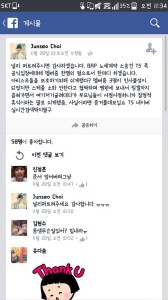 Adding to the accounts, Zelo‘s older brother Choi Jun-seo refuted TS’s claims of “misunderstanding” through his Facebook account. At one point, he claimed, three of the members were nearly unconscious with exhaustion and were still threatened with the same monetary damages for missed schedules before being sent to the hospital to receive IVs, while TS refused the parents’ pleas for a break multiple times before agreeing merely a few months ago.
Adding to the accounts, Zelo‘s older brother Choi Jun-seo refuted TS’s claims of “misunderstanding” through his Facebook account. At one point, he claimed, three of the members were nearly unconscious with exhaustion and were still threatened with the same monetary damages for missed schedules before being sent to the hospital to receive IVs, while TS refused the parents’ pleas for a break multiple times before agreeing merely a few months ago.
While the fate of B.A.P is left up in the air, the decision of all six members to file a lawsuit together, as well as reassuring messages left by the members in the days leading up to the lawsuit filing, are a hopeful sign that the group will stay as six. Their lawsuit sends reverberations through the music industry as one in a series of idol versus company cases this year and stands as significant with the group filing in a collective stand to dispute their company’s mistreatment and disrespect. Whatever the verdict, here’s to hoping B.A.P’s decision for legal action brings about fairer industry standards and a shift from idols as company commodities to actual human beings.
(Xportnews, Dispatch, TVreports, TS Entertainment, YouTube, Twitter, Facebook, Images via TS Entertainment, Dispatch, Twitter, Instagram, Facebook)
